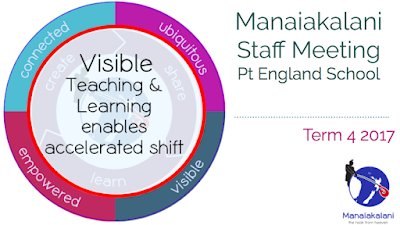PD with Dorothy - Visible Teaching and Learning enables Accelerated Shift
Some thoughts and tid-bits from Dorothy Burt speaking about how 'Visibility enables accelerated shift'. I found it interesting how Dorothy talked about how all of these 4 pieces to the Manaiakalani puzzle; learn, create and share, must be working together in order to get the accelerated shift that we want. You can be creating as much as you want, but as a teacher if you are not allowing them to share this then that us not the manaiakalani way, and therefore you are less likely to see shift. This is something I can definitely think about in my teaching and will need to think about next year moving into the senior school teaching Y6.
It is vital to remember that as Teachers make a difference, even if some times we may not feel this way! We make shift happen.
I found this excerpt, taken from Dorothy's Google Presentation particularly interesting; "Collective teacher efficacy is beyond three times more powerful and predictive than socio-economic status (0.52). It is also greater than three times more likely to influence student achievement than student motivation and concentration, persistence, and engagement (0.48)."
Dorothy asked us to have a look at one of our children who has made impressive shift. I haven't stayed in a class long enough to feel as though I can make claim to this (as I have travelled for 3 months in 2017). I am going to try and make some notes from some of the research that Dorothy has highlighted in the Google Presentation.
I read John Hattie's research 'WHAT WORKS BEST IN EDUCATION: THE POLITICS OF COLLABORATIVE EXPERTISE'.
I wanted note some gems I took from this reading.
TASK 1: We need to change our way of thinking as people of the teaching profession. Instead of blaming the teacher we need to work as a collaborative group, drawing on people's strengths. Working alone, and 'one teacher at a time' will not help us raise student achievement. This is something I think we are beginning to do well at Point England School. Coming together twice a term to discuss our Inquiries.
TASK 3: EXPECT A YEAR’S WORTH OF PROGRESS. As teachers, we cannot expect a year's worth of progress if we do not have high expectations for ALL those children in our class. I think it is incredibly important that every child in your class, whether they are oh low or high ability, know that you expect them to do and try their best at all times. Not only this, but to know that you believe in them and believe that they can improve in all learning areas.
Task #4: DEVELOP NEW ASSESSMENT AND EVALUATION TOOLS to provide feedback to teachers. It is clear that more research is required on how teachers can create reports taken from tests, use this to work out what their next teaching interventions should be. It is time that we move ahead of a conversation that is too only focussed on tests and assessment data. Thinking of this, what else can else can we focus on? The list below were some things I came up with:
1. To what extent, and how well do our students engage in collaborative problem-solving?
2. What are our children's strengths in relation to the key competencies? (link to these)


Comments
Post a Comment